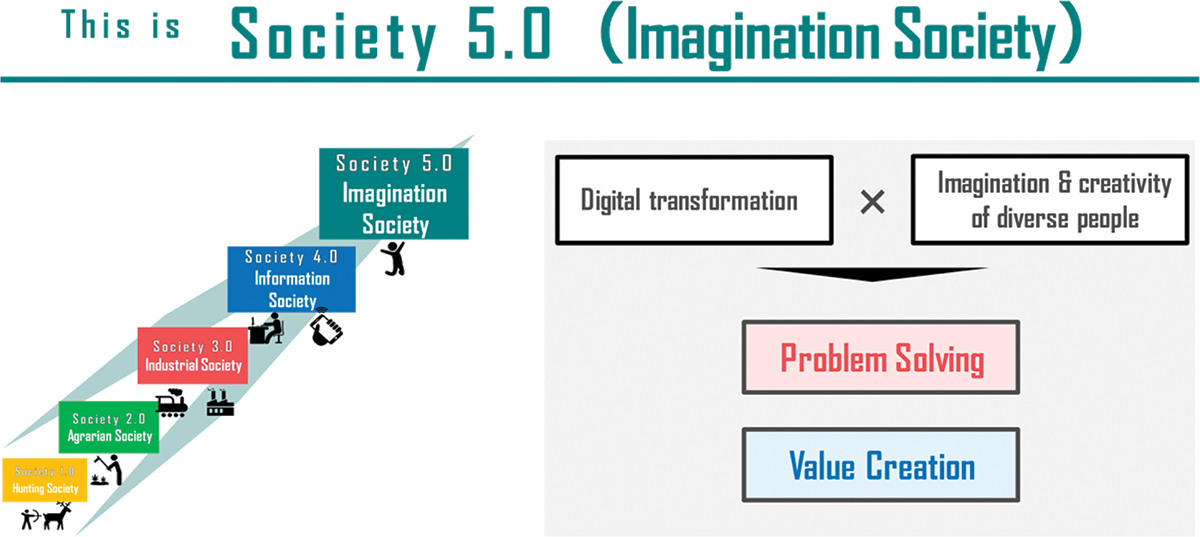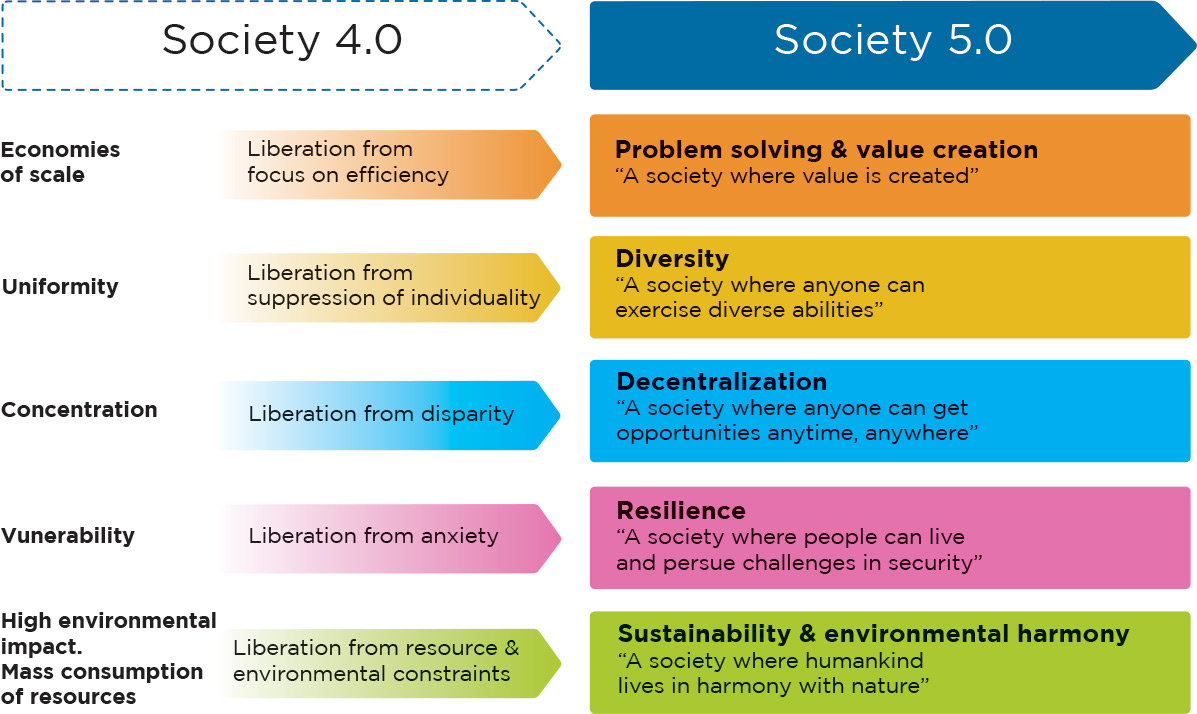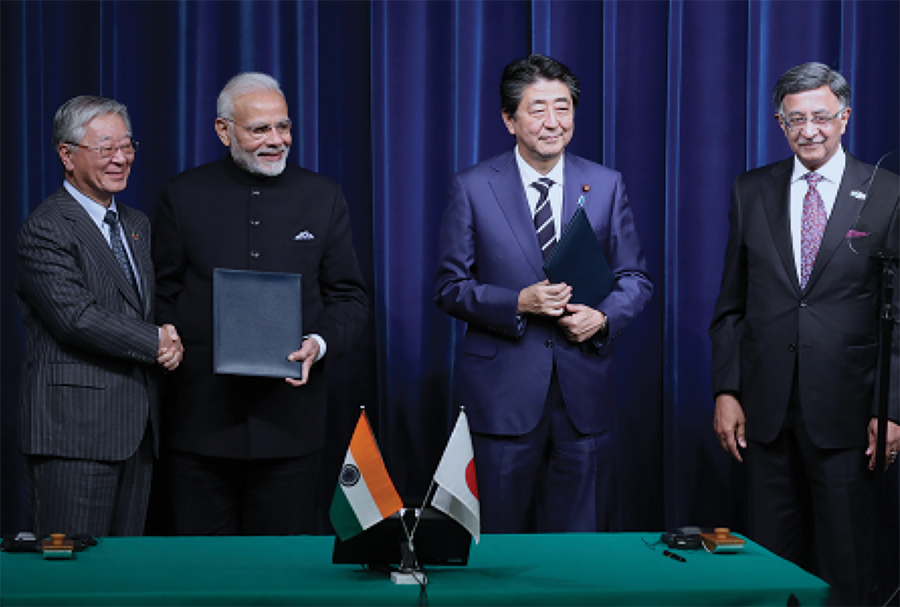society 5.0
feature
Updates on Japanese Business and Economy
CSIS Japan Chair, Keidanren Strategic International Initiative and Keizai Koho Center (KKC, Japan Institute for Social and Economic Affairs) co-hosted a symposium to commemorate the 40th anniversary of KKC at CSIS Headquarters on November 16.
Japan is committed to Society 5.0. It is the vision of an emerging form of society characterized as “Imagination Society” enabled by the digital transformation. On November 13, Keidanren released a proposal titled “Society 5.0 – Co-creating the future -” setting out the concept of, and drawing a concrete picture of Society 5.0 as a future society that we wish to create with the world.
Change caused by digital transformation
The world is now facing a great tide of change. The trend of digital transformation cannot be stopped and is drastically changing multiple aspects of society including private lives, public administration, industrial structure and employment. While new technologies could bring about merits such as higher standards of living and better convenience, they could have negative effects such as impact on employment, growing disparity and maldistribution of wealth and information. It is up to us to choose which direction to go. We must consider what kind of society we wish to create rather than trying to foresee the kind of society it will be.
What Society 5.0 is
Therefore, Japan will take the initiative in guiding the world to a brighter future by demonstrating an ideal concept of the next society, named as Society 5.01 .In the proposal, Keidanren has redefined Society 5.0 as “Imagination Society”. People are expected to exercise their rich imaginations to identify a variety of needs and challenges scattered throughout society and scenarios to solve them, as well as creativity to realize such solutions making use of digital technologies and data. Society 5.0 will be an Imagination Society, where digital transformation combines with the imagination and creativity of diverse people to bring about “problem solving” and “value creation” that lead us to sustainable development. It is a concept that can contribute to the achievement of the Sustainable Development Goals (SDGs) adopted by the United Nations.
What Society 5.0 brings about
In Society 5.0, people will be liberated from various constraints that could not have been overcome up to Society 4.0 and will obtain the freedom to pursue diverse lifestyles and values. In short, we will make Society 5.0 a society in which anyone can create values anytime, anywhere, with security and in harmony with nature.
In the report, Keidanren has described specific images of Society 5.0 picking up some of the most important areas2.
Keidanren is working together with the government and other stakeholders on corporate and labor policy reform, human resource development, establishment of data policy, enhancement of research and development, governmental reform, etc. for the realization of Society 5.0. We wish to share the goal with our partners in the world and co-create the future.


On November 13, Keidanren released a proposal titled “COP24 – Realizing effective and fair global warming countermeasures under the Paris”.
COP24 negotiation “Need for ensuring effectiveness and fairness”
COP24, to be held in December 2018, aims to reach agreement on the implementation guidelines for the Paris Agreement. However, negotiations are still only halfway towards agreement. From the perspective of equal footing in the international business environment, it is vital that the Paris Agreement ensure effectiveness and fairness.
Agreement on key issues
In order to ensure effectiveness nd fairness of the Paris Agreement, it is essential to fulfill the necessary requirements, the main ones being “all countries’ participation in the Agreement”, “common rules for all countries”, and “promotion of an appropriate PDCA cycle based upon the pledge and review approach”. In particular, “transparency” and “finance” are considered key issues that influence effectiveness and fairness of the Agreement. As for “transparency”, rules prepared for developed countries should be commonly applied to emerging countries with sufficient capacities such as China. About “finance”, it is desirable that rules should be worked out by which each country will make fair contributions according to its capacities.
Attention on non-state actors “For improved Japanese international presence”
Recently, increasing attention is being paid to actions by non-state actors. During COP, their side events and other activities are highlighted, demonstrating their growing complementary role to national actions. Keidanren will take actions to raise Japan’s international presence through dissemination of information at side events during COP243. Efforts will be made to gain an understanding of contributions to avoided emissions through the Global Value Chain (GVC). In order to extend this approach globally, Keidanren has recently compiled and published a concept book “Contributing to Avoided Emissions through Global Value Chain”4. Furthermore, Keidanren will further strengthen collaboration with economic organizations of major countries at Whe B20 and thereby promote global actions to realize global warming countermeasures.
In the 11th Forum held in Tokyo on October 29th, the business leaders of Japan and India discussed the three main themes: (1) Maintain and strengthen the free and open international economic order and fostering economic partnerships, (2) Expand economic exchange through improvements in the business environment, (3) Achieve inclusive growth through strengthened cooperation in strategically important fields, and put together the Joint Report summarizing the outcomes of their discussions.


As concerns mount over the spread of anti-globalization and protectionist sentiment worldwide, it is vital that steps be taken to maintain and strengthen the free and open international economic order that has sustained global stability and prosperity, and move forward with the development of a trade and investment climate that facilitates free, cross-border flows of goods, services, capital, people, technology, data, and other resources. From these perspectives, business leaders from Japan and India acknowledged the need to swiftly conclude a comprehensive, high-level agreement on the Regional Comprehensive Economic Partnership (RCEP) that is currently being negotiated.
2. Expanding economic exchange through improvements to the business environment
Business leaders from Japan and India strongly commended the implementation of the Goods and Services Tax (GST) by India in July last year. On the other hand, Japan’s business leaders call on the Government of India to continue working to streamline and speed up the GST system and related procedures; promote tax system reorganization and rationalization; assure international consistency of the tax system including revisions to the Master File requirement; ensure the free flow of data by rescinding regulations on data localization; develop and digitize general rules on administrative procedure; and ensure the transparency and fulfillment of administrative contracts.
of wealth and information.
To achieve the Sustainable Development Goals (SDGs), the private sector is needed to exercise its ingenuity and strengths in innovation. From this perspective, efforts to further strengthen initiatives by both countries -Society 5.0 in Japan, and national initiatives in India such as Digital India and Startup India- and pursue cooperation that reciprocally complements their competitive positions will enable Japan and India to collaborate and lead in the creation of innovations that are aimed at achieving inclusive growth.
- The 5th stage of human society following Hunting, Agrarian, Industrial and Information Societies. It was officially presented for the first time in the 5th Science and Technology Basic Plan in January 2016.
- Smart cities, energy, disaster response, healthcare, agriculture, logistics, manufacturing and services, finance and public services
- Keidanren’s side event at COP24 will be held at 13:15-14:45 on 12 December.
- http://www.keidanren.or.jp/en/policy/index07.html